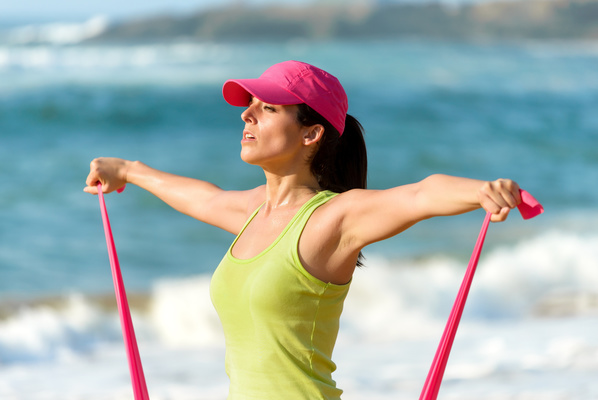IT’S well known that women who exercise regularly after a breast cancer diagnosis have better health outcomes, including higher rates of survival.
Unfortunately, few breast cancer patients actually do enough physical exercise to achieve these benefits.
Research in this field has demonstrated physical activity during and following breast cancer treatment is safe and effective, but it’s an ongoing challenging knowing how to best help women to get started on a fitness regime and then keep it up.
NBCF-funded researcher Brigid Lynch from Cancer Council Victoria said there can be many reasons why women who have had breast cancer might avoid extra physical activity, such as having low fitness levels or feeling fatigued easily.
“Knowing this, we still want to encourage them to get out and about as often as possible to optimise health outcomes,” Dr Lynch said.
“Heath care teams need the tools and knowledge to provide strategies that will help these women do some activity even when they really don’t feel like it.”
Dr Lynch said she believed the rise of wearable technology (‘wearables’) such as Apple watches, Fitbits and Garmin devices which collected and analysed data on the physical activity of the wearer, may hold the answer.
“Wearables allow users to easily self-monitor their physical activity behaviour. These devices provide real-time feedback, which helps to motivate individuals to improve their efforts and achieve their exercise goals,” Dr Lynch said.
Dr Lynch said she sees great potential to harness the popularity of wearables to facilitate behaviour change amongst breast cancer survivors.
“One of the most appealing aspects is that each device is relatively inexpensive and can be used almost anywhere – there aren’t really any social or geographical barriers to the use of wearables,” she said.
Healthcare professionals are already beginning to tap into the potential power of the burgeoning wearables industry, particularly for people with chronic conditions – a move that has generated excitement among many health experts although not everyone is convinced.
Currently the capacity of wearables to create sustainable behavioural changes, either alone or as part of a broader intervention approach, is unknown and unsupported by reliable data.
Dr Lynch aims to fill this knowledge gap by undertaking a trial to measure the impact of wearables on the outcomes for women after completing breast cancer treatment – information that will underpin the decisions of healthcare professionals recommending their use.
The ACTIVATE Trial will test whether using wearables can increase physical activity and reduce the amount of time spent sitting by women who have undergone treatment for breast cancer.
In the meantime, there are a range of breast cancer survivor exercise programs throughout the Noosa Shire and Sunshine Coast such as the paddle board group at Boardwalk Boat Hire.
Anyone seeking upper-body exercise can take part in the Boardwalk Boat Hire Wednesday morning paddle that heads out from the jetty behind the Sofitel Hotel, Noosa Heads, at 7am.
Anyone who is a breast cancer survivor and has been given the OK by their doctor can take part in the free stand-up paddle board and kayak activity each week along with other breast cancer survivors. Phone Boardwalk Boat Hire on 5455 3755 for more information.
Actively involved in good health

Digital Edition
Subscribe
Get an all ACCESS PASS to the News and your Digital Edition with an online subscription


![[READER COMPETITION] – Win a family ticket to see The Riddle of Washpool Gully at the J](https://noosatoday.com.au/wp-content/uploads/2026/02/washpool-gully-1-324x235.png)





